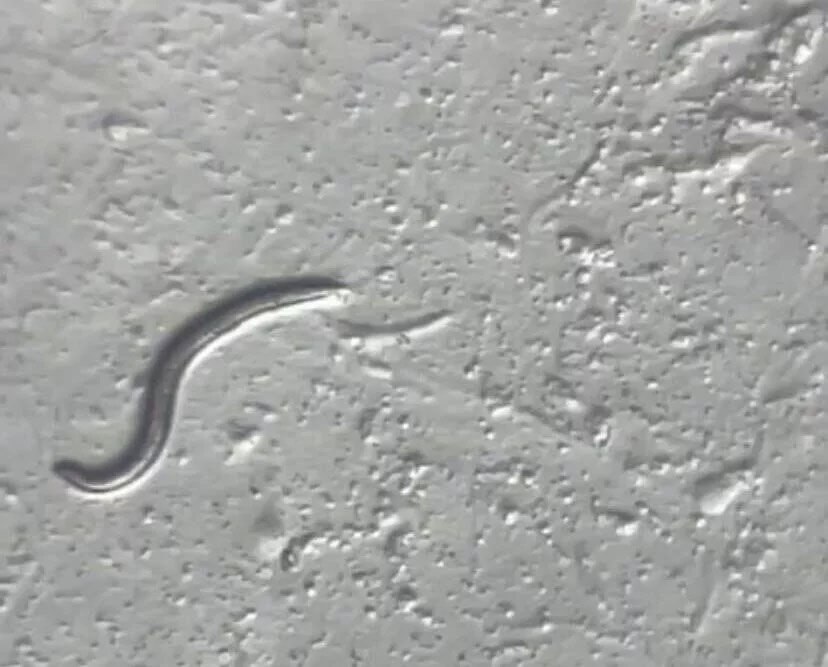 A Panagrolaimus kolymaensis nematode is seen under the microscope at the University of Cologne's worm lab in Germany.
A Panagrolaimus kolymaensis nematode is seen under the microscope at the University of Cologne's worm lab in Germany.A tiny roundworm was revived after it was frozen in Siberian permafrost 46,000 years ago, when Neanderthals still walked the Earth.
The worm, a previously unknown species of nematode, survived after entering a dormant state known as cryptobiosis, during which the animal doesn't eat and lacks a metabolism. The finding was detailed in a recent study published in the journal PLOS Genetics.
The most stunning part of the discovery was the length of time the worm had endured cryptobiosis, said Philipp Schiffer, one of the study's authors and a group leader at the Institute of Zoology at the University of Cologne in Germany.
Nematodes are among the planet's most ubiquitous life forms. Scientists had known that some could survive long periods of suspended animation in subzero environments. One Antarctic species spent over 25 years in frozen moss before resuscitation, the previous longest record of cryptobiosis recorded for a nematode.
 A collage made by two of the study's authors shows the permafrost sample where the nematode survived for 46,000 years, and a close-up of the microscopic nematode itself.
A collage made by two of the study's authors shows the permafrost sample where the nematode survived for 46,000 years, and a close-up of the microscopic nematode itself."Nobody had thought that this process could be for millennia, for 40,000 years — or even longer," Schiffer said. "It's just amazing that life can start again after such a long time, in the stage between life and death."
Scientists used radiocarbon dating to determine that the soil from the permafrost sample was 46,000 years old.
Some nematodes are also known to survive parched climates, like in Chile's Atacama Desert, the driest nonpolar desert on Earth. One species was revived after spending nearly 40 years desiccated in a dry herbarium.
"Everything seems to be possible for these animals and that's what makes them so fascinating," the scientist said.
Schiffer says his worm lab in Cologne was able to analyze and identify the novel worm, which researchers named Panagrolaimus kolymaensis, using genome sequencing.
The nematode was found about 130 feet deep within the permafrost inside a burrow once home to Arctic gophers. After the chunk of frozen sediment was taken to the lab to thaw, the resurrected nematode crawled out and started making babies. The nematode, a female-only species, reproduces asexually, after about eight to 12 days.
The original worm, found five years ago, has died. Scientists are using its descendants to continue their research on the species, which will primarily involve investigating the genetic machinery behind these organisms to learn how these worms evolve to adapt in extreme environments.
That work could reveal how other animals might harbor the genetic superpowers to adapt to extreme environments today, as climate change drives more frequent heat waves and uninhabitable environments, Schiffer says.
"You might learn a lot about how and what's happening right now on Earth, and maybe even inform protection of endangered species," he said.
One challenge in researching the DNA sequences of this particular species, he adds, is how quickly the nematode evolves during its short life. The lifespan of Panagrolaimus kolymaensis is just one to two months.
Unless, of course, it happens to get frozen in time.

By submitting your comments, you hereby give AZPM the right to post your comments and potentially use them in any other form of media operated by this institution.